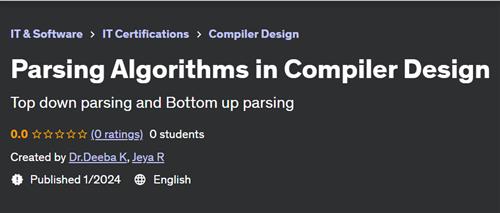
Free Download Parsing Algorithms in Compiler Design
Published 1/2024
Created by Dr.Deeba K,Jeya R
MP4 | Video: h264, 1280x720 | Audio: AAC, 44.1 KHz, 2 Ch
Genre: eLearning | Language: English | Duration: 20 Lectures ( 4h 21m ) | Size: 3.65 GB
Top down parsing and Bottom up parsing
What you'll learn
Different types of parser in compiler
Recursive Descent Parsing
Predictive Parser
Operator Precedence Parser
Simple LR Parser
LALR and CLR parsers
Requirements
No prerequisites are there for this course.
Description
Compiler design is a crucial aspect of programming language development, responsible for translating high-level source code into machine code that can be executed by a computer. One of the key phases in this process is parsing, where the compiler analyzes the syntactic structure of the source code to create a parse tree or abstract syntax tree. Various parsing algorithms are employed to achieve this, each with its strengths and weaknesses. This article explores the fundamentals of parsing algorithms in compiler design, shedding light on their significance and characteristics.Top-Down Parsing:Top-down parsing is an approach where the parsing process begins with the highest-level grammar production and gradually explores the lower-level productions until the entire parse tree is constructed. Common top-down parsing techniques include Recursive Descent Parsing and LL Parsing. Recursive Descent Parsing involves creating recursive procedures to match grammar rules, while LL Parsing utilizes a table-driven approach based on the LL(k) grammar class.Bottom-Up Parsing:In contrast, bottom-up parsing builds the parse tree from the leaves (tokens) to the root. Shift-Reduce Parsing and LR Parsing are popular bottom-up parsing techniques. Shift-Reduce Parsing involves shifting tokens onto a stack and then reducing them based on predefined grammar rules, while LR Parsing employs a state machine and a lookahead buffer to determine valid reductions.LR Parsing is a widely used bottom-up parsing technique with several variants, including SLR, LALR, and LR(1). These variants differ in the complexity of their parsing tables and the amount of lookahead information they consider. SLR (Simple LR) Parsing and LALR (Look-Ahead LR) Parsing are more efficient in terms of table size, while LR(1) Parsing offers greater parsing power at the cost of increased table complexity.
Who this course is for
Computer science students
Students preparing for Gate exams
Anyone planing for Government Exams in Computer Science base
Homepage
https://www.udemy.com/course/parsing-algorithms-in-compiler-design/Rapidgator
aeiga.Parsing.Algorithms.in.Compiler.Design.part3.rar.html
aeiga.Parsing.Algorithms.in.Compiler.Design.part2.rar.html
aeiga.Parsing.Algorithms.in.Compiler.Design.part1.rar.html
aeiga.Parsing.Algorithms.in.Compiler.Design.part4.rar.html
Uploadgig
aeiga.Parsing.Algorithms.in.Compiler.Design.part1.rar
aeiga.Parsing.Algorithms.in.Compiler.Design.part4.rar
aeiga.Parsing.Algorithms.in.Compiler.Design.part3.rar
aeiga.Parsing.Algorithms.in.Compiler.Design.part2.rar
NitroFlare
aeiga.Parsing.Algorithms.in.Compiler.Design.part3.rar
aeiga.Parsing.Algorithms.in.Compiler.Design.part1.rar
aeiga.Parsing.Algorithms.in.Compiler.Design.part4.rar
aeiga.Parsing.Algorithms.in.Compiler.Design.part2.rar
Fikper
aeiga.Parsing.Algorithms.in.Compiler.Design.part2.rar.html
aeiga.Parsing.Algorithms.in.Compiler.Design.part1.rar.html
aeiga.Parsing.Algorithms.in.Compiler.Design.part4.rar.html
aeiga.Parsing.Algorithms.in.Compiler.Design.part3.rar.html
Parsing Algorithms in Compiler Design Torrent Download , Parsing Algorithms in Compiler Design Watch Free Online , Parsing Algorithms in Compiler Design Download Online
